By Kyle Nicholas · Thursday, October 22, 2015 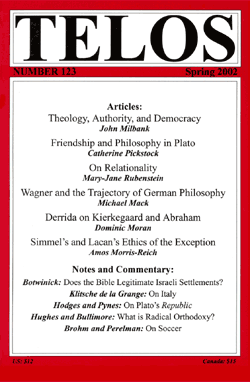 Mention “Radical Orthodoxy” in a room of people who are either quite intimately or only remotely acquainted with contemporary theology, and one surely will receive equal parts of praise and scorn. Whether it is being praised or scorned, however, it is plain that Radical Orthodoxy has worked its way deep into the fabric of contemporary theological discourse. Since the publication of John Milbank’s Theology and Social Theory in 1992, Catherine Pickstock’s After Writing in 1997, and Radical Orthodoxy: A New Theology, edited by Milbank, Pickstock, and Graham Ward in 1998, the Radical Orthodoxy movement has done what any explosively innovative intellectual movement will do after the hype settles down: mature or wither away. Mention “Radical Orthodoxy” in a room of people who are either quite intimately or only remotely acquainted with contemporary theology, and one surely will receive equal parts of praise and scorn. Whether it is being praised or scorned, however, it is plain that Radical Orthodoxy has worked its way deep into the fabric of contemporary theological discourse. Since the publication of John Milbank’s Theology and Social Theory in 1992, Catherine Pickstock’s After Writing in 1997, and Radical Orthodoxy: A New Theology, edited by Milbank, Pickstock, and Graham Ward in 1998, the Radical Orthodoxy movement has done what any explosively innovative intellectual movement will do after the hype settles down: mature or wither away.
In their article “What is Radical Orthodoxy?” (Telos 123, Spring 2002), John Hughes and Matthew Bullimore map out, in a short space and yet with crisp detail, the main themes in the Radical Orthodoxy project. For those familiar with the movement, their points will not come as a shock: that a deep metaphysical violence underlies modernity, political liberalism, and capitalism; that the philosophical and theological dualisms of modernity must be named and then overcome with the aid of both premodern and postmodern thought; and that in the face of proliferating violence it is Christian orthodoxy—in line with Aquinas, Boethius, Augustine, Gregory of Nyssa, and Iamblichean Neo-Platonism—that presents truly “radical” alternatives to the prevailing political, philosophical, and theological orders.
Continue reading →
By Kyle Nicholas · Tuesday, July 21, 2015 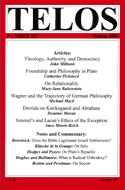 In his article “The Last of the Last: Theology, Authority, and Democracy,” from Telos 123 (Spring 2002), John Milbank argues that theology’s proper role is within the Church extended through time and space, rather than as “‘a public discourse’ answerable to the critical norms and liberal values.” Yet his claim does not come without qualification. Many aspects of theological inquiry that were once held together have splintered since 1300 CE: faith and reason, scripture and tradition, and theology under ecclesial authority, in particular. Here the Church is actually more to blame, both Protestantism and Post-Tridentine Catholicism, than some (fictional) increasingly enlightened and liberated society. In his article “The Last of the Last: Theology, Authority, and Democracy,” from Telos 123 (Spring 2002), John Milbank argues that theology’s proper role is within the Church extended through time and space, rather than as “‘a public discourse’ answerable to the critical norms and liberal values.” Yet his claim does not come without qualification. Many aspects of theological inquiry that were once held together have splintered since 1300 CE: faith and reason, scripture and tradition, and theology under ecclesial authority, in particular. Here the Church is actually more to blame, both Protestantism and Post-Tridentine Catholicism, than some (fictional) increasingly enlightened and liberated society.
Continue reading →
By Mary Frances McKenna · Thursday, October 30, 2014 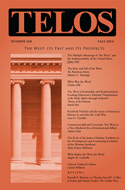 In this article, I focus on the impact on modern Western thinking, ideas, and engagement with the world of the loss of the assumption of a creator, or an intelligent ordering agent, in conjunction with the emphasis on detail in preference to the whole in modern thought. I begin by discussing some of the critical dynamics contributed by Jerusalem, Athens, and Rome to the concept of Europe in an attempt to identify the source of the energy and vitality arising from this synthesis. I particularly look at the synthesis of Jerusalem and Athens, specifically how each influenced the other and where the potential for synergy arose. This Western synthesis no longer operates in Europe and the West. In this article, I focus on the impact on modern Western thinking, ideas, and engagement with the world of the loss of the assumption of a creator, or an intelligent ordering agent, in conjunction with the emphasis on detail in preference to the whole in modern thought. I begin by discussing some of the critical dynamics contributed by Jerusalem, Athens, and Rome to the concept of Europe in an attempt to identify the source of the energy and vitality arising from this synthesis. I particularly look at the synthesis of Jerusalem and Athens, specifically how each influenced the other and where the potential for synergy arose. This Western synthesis no longer operates in Europe and the West.
Continue reading →
By Mario Bosincu · Thursday, October 2, 2014 The following paper was presented at the recent Telos in Europe conference on “The Idea of Europe,” held in L’Aquila, Italy, on September 5–8, 2014.
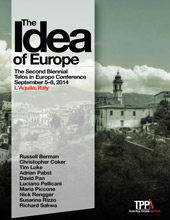 In a paragraph of Daybreak, Nietzsche spoke of Romanticism’s “great reaction”[1] to the Enlightenment. Zeev Sternhell has brought out two distinctive elements of this centuries-long European revolt against the “rationalist modernity”:[2] the rejection of the claim to “mold people’s lives” by means of enlightened reason, and the reevaluation of faith as “an essential foundation of society”[3] accompanied by the idealization of the spiritually united medieval civilization as contrasted with the atomized modern society in the grip of decadence. This current of thought was the symptom of the crisis of the pre-Enlightenment traditional societies, described by Professor Pellicani as closed, static, rigidly prescriptive cultural universes in which, to cite Jaspers, “everything is under the control of symbols of being, held fast in unquestioned orders.”[4] The anti-Enlightenment movement aimed precisely at refounding these collapsed civilizations. One thinks of Novalis’s picture of medieval Europe pacified by the all-binding force of Christendom embodied by the clergy exercising a pastoral power in order to reshape men into salvation-worthy subjects. In a paragraph of Daybreak, Nietzsche spoke of Romanticism’s “great reaction”[1] to the Enlightenment. Zeev Sternhell has brought out two distinctive elements of this centuries-long European revolt against the “rationalist modernity”:[2] the rejection of the claim to “mold people’s lives” by means of enlightened reason, and the reevaluation of faith as “an essential foundation of society”[3] accompanied by the idealization of the spiritually united medieval civilization as contrasted with the atomized modern society in the grip of decadence. This current of thought was the symptom of the crisis of the pre-Enlightenment traditional societies, described by Professor Pellicani as closed, static, rigidly prescriptive cultural universes in which, to cite Jaspers, “everything is under the control of symbols of being, held fast in unquestioned orders.”[4] The anti-Enlightenment movement aimed precisely at refounding these collapsed civilizations. One thinks of Novalis’s picture of medieval Europe pacified by the all-binding force of Christendom embodied by the clergy exercising a pastoral power in order to reshape men into salvation-worthy subjects.
Continue reading →
By John Milbank and Adrian Pabst · Thursday, August 14, 2014 We agree with Joshua Ralston that all forms of religious fundamentalism demand both universal and unconditional condemnation as well as regional and global responses to help all the victims—irrespective of their faith. We also agree with him that it is wrong to judge age-old religious traditions by modern secular, liberal standards and that essentialized notions distort complex cultural and historical realities.
Continue reading →
By Matthew Bagot · Monday, May 5, 2014 The following paper was originally prepared for the Eighth Annual Telos Conference, held on February 15–16, 2014, in New York City.
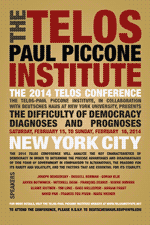 In this paper, I will try to show the positive potential of religion for democracy in light of some theoretical and practical considerations. At the theoretical level, a debate on the proper relation of religion to politics has taken place between certain “liberal” political theorists who are suspicious of religion for good historical reasons and a number of Christian authors who argue that religion can enrich our public life.[1] One such author, David Hollenbach, S.J., bases his argument on an approach to the common good—defined in Catholic teaching as “the sum of those conditions of social life which allow social groups and their individual members relatively thorough and ready access to their own fulfillment”[2]—that he discerns at the Second Vatican Council (1962–65) and calls “dialogic universalism.”[3] In this paper, I will try to show the positive potential of religion for democracy in light of some theoretical and practical considerations. At the theoretical level, a debate on the proper relation of religion to politics has taken place between certain “liberal” political theorists who are suspicious of religion for good historical reasons and a number of Christian authors who argue that religion can enrich our public life.[1] One such author, David Hollenbach, S.J., bases his argument on an approach to the common good—defined in Catholic teaching as “the sum of those conditions of social life which allow social groups and their individual members relatively thorough and ready access to their own fulfillment”[2]—that he discerns at the Second Vatican Council (1962–65) and calls “dialogic universalism.”[3]
Continue reading →
|
|
 Mention “Radical Orthodoxy” in a room of people who are either quite intimately or only remotely acquainted with contemporary theology, and one surely will receive equal parts of praise and scorn. Whether it is being praised or scorned, however, it is plain that Radical Orthodoxy has worked its way deep into the fabric of contemporary theological discourse. Since the publication of John Milbank’s Theology and Social Theory in 1992, Catherine Pickstock’s After Writing in 1997, and Radical Orthodoxy: A New Theology, edited by Milbank, Pickstock, and Graham Ward in 1998, the Radical Orthodoxy movement has done what any explosively innovative intellectual movement will do after the hype settles down: mature or wither away.
Mention “Radical Orthodoxy” in a room of people who are either quite intimately or only remotely acquainted with contemporary theology, and one surely will receive equal parts of praise and scorn. Whether it is being praised or scorned, however, it is plain that Radical Orthodoxy has worked its way deep into the fabric of contemporary theological discourse. Since the publication of John Milbank’s Theology and Social Theory in 1992, Catherine Pickstock’s After Writing in 1997, and Radical Orthodoxy: A New Theology, edited by Milbank, Pickstock, and Graham Ward in 1998, the Radical Orthodoxy movement has done what any explosively innovative intellectual movement will do after the hype settles down: mature or wither away.  In his article “The Last of the Last: Theology, Authority, and Democracy,” from Telos 123 (Spring 2002), John Milbank argues that theology’s proper role is within the Church extended through time and space, rather than as “‘a public discourse’ answerable to the critical norms and liberal values.” Yet his claim does not come without qualification. Many aspects of theological inquiry that were once held together have splintered since 1300 CE: faith and reason, scripture and tradition, and theology under ecclesial authority, in particular. Here the Church is actually more to blame, both Protestantism and Post-Tridentine Catholicism, than some (fictional) increasingly enlightened and liberated society.
In his article “The Last of the Last: Theology, Authority, and Democracy,” from Telos 123 (Spring 2002), John Milbank argues that theology’s proper role is within the Church extended through time and space, rather than as “‘a public discourse’ answerable to the critical norms and liberal values.” Yet his claim does not come without qualification. Many aspects of theological inquiry that were once held together have splintered since 1300 CE: faith and reason, scripture and tradition, and theology under ecclesial authority, in particular. Here the Church is actually more to blame, both Protestantism and Post-Tridentine Catholicism, than some (fictional) increasingly enlightened and liberated society.  In this article, I focus on the impact on modern Western thinking, ideas, and engagement with the world of the loss of the assumption of a creator, or an intelligent ordering agent, in conjunction with the emphasis on detail in preference to the whole in modern thought. I begin by discussing some of the critical dynamics contributed by Jerusalem, Athens, and Rome to the concept of Europe in an attempt to identify the source of the energy and vitality arising from this synthesis. I particularly look at the synthesis of Jerusalem and Athens, specifically how each influenced the other and where the potential for synergy arose. This Western synthesis no longer operates in Europe and the West.
In this article, I focus on the impact on modern Western thinking, ideas, and engagement with the world of the loss of the assumption of a creator, or an intelligent ordering agent, in conjunction with the emphasis on detail in preference to the whole in modern thought. I begin by discussing some of the critical dynamics contributed by Jerusalem, Athens, and Rome to the concept of Europe in an attempt to identify the source of the energy and vitality arising from this synthesis. I particularly look at the synthesis of Jerusalem and Athens, specifically how each influenced the other and where the potential for synergy arose. This Western synthesis no longer operates in Europe and the West.  In a paragraph of Daybreak, Nietzsche spoke of Romanticism’s “great reaction”[1] to the Enlightenment. Zeev Sternhell has brought out two distinctive elements of this centuries-long European revolt against the “rationalist modernity”:[2] the rejection of the claim to “mold people’s lives” by means of enlightened reason, and the reevaluation of faith as “an essential foundation of society”[3] accompanied by the idealization of the spiritually united medieval civilization as contrasted with the atomized modern society in the grip of decadence. This current of thought was the symptom of the crisis of the pre-Enlightenment traditional societies, described by Professor Pellicani as closed, static, rigidly prescriptive cultural universes in which, to cite Jaspers, “everything is under the control of symbols of being, held fast in unquestioned orders.”[4] The anti-Enlightenment movement aimed precisely at refounding these collapsed civilizations. One thinks of Novalis’s picture of medieval Europe pacified by the all-binding force of Christendom embodied by the clergy exercising a pastoral power in order to reshape men into salvation-worthy subjects.
In a paragraph of Daybreak, Nietzsche spoke of Romanticism’s “great reaction”[1] to the Enlightenment. Zeev Sternhell has brought out two distinctive elements of this centuries-long European revolt against the “rationalist modernity”:[2] the rejection of the claim to “mold people’s lives” by means of enlightened reason, and the reevaluation of faith as “an essential foundation of society”[3] accompanied by the idealization of the spiritually united medieval civilization as contrasted with the atomized modern society in the grip of decadence. This current of thought was the symptom of the crisis of the pre-Enlightenment traditional societies, described by Professor Pellicani as closed, static, rigidly prescriptive cultural universes in which, to cite Jaspers, “everything is under the control of symbols of being, held fast in unquestioned orders.”[4] The anti-Enlightenment movement aimed precisely at refounding these collapsed civilizations. One thinks of Novalis’s picture of medieval Europe pacified by the all-binding force of Christendom embodied by the clergy exercising a pastoral power in order to reshape men into salvation-worthy subjects.  In this paper, I will try to show the positive potential of religion for democracy in light of some theoretical and practical considerations. At the theoretical level, a debate on the proper relation of religion to politics has taken place between certain “liberal” political theorists who are suspicious of religion for good historical reasons and a number of Christian authors who argue that religion can enrich our public life.[1] One such author, David Hollenbach, S.J., bases his argument on an approach to the common good—defined in Catholic teaching as “the sum of those conditions of social life which allow social groups and their individual members relatively thorough and ready access to their own fulfillment”[2]—that he discerns at the Second Vatican Council (1962–65) and calls “dialogic universalism.”[3]
In this paper, I will try to show the positive potential of religion for democracy in light of some theoretical and practical considerations. At the theoretical level, a debate on the proper relation of religion to politics has taken place between certain “liberal” political theorists who are suspicious of religion for good historical reasons and a number of Christian authors who argue that religion can enrich our public life.[1] One such author, David Hollenbach, S.J., bases his argument on an approach to the common good—defined in Catholic teaching as “the sum of those conditions of social life which allow social groups and their individual members relatively thorough and ready access to their own fulfillment”[2]—that he discerns at the Second Vatican Council (1962–65) and calls “dialogic universalism.”[3] 

